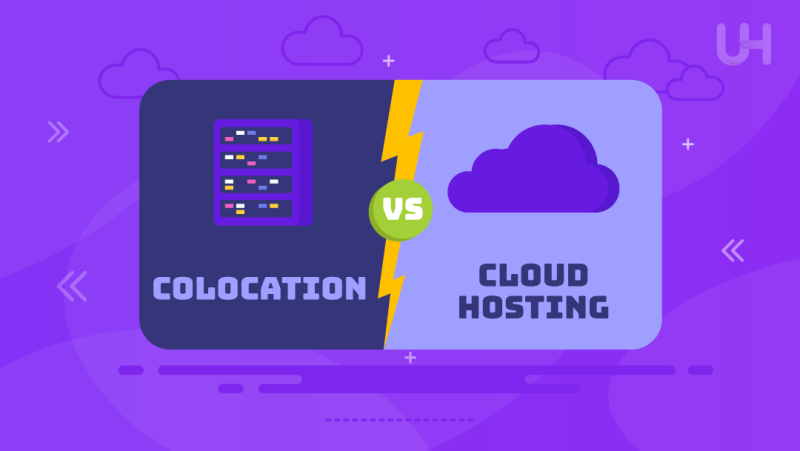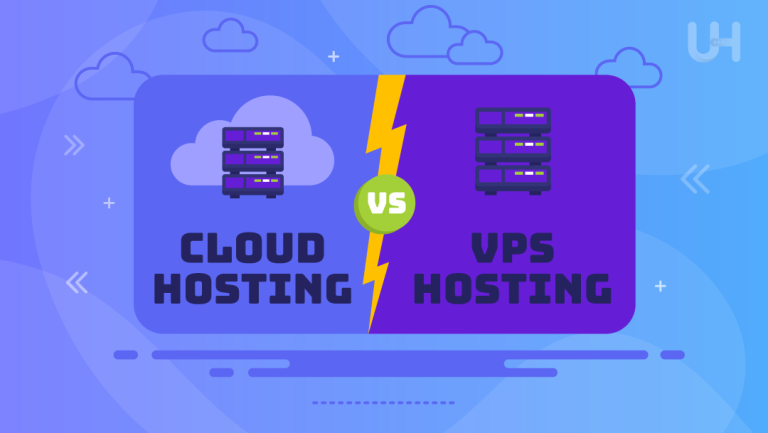Enterprises have to make imperative decisions when it comes to their IT infrastructure. Nowadays, two of the effective options available are colocation or cloud hosting. Making the right decision between colocation vs cloud hosting makes all the difference in the performance, scalability, and economies of scale of an organization.
In this blog, we will break down colocation vs cloud hosting and look at both the pros and cons of each. These key factors, in turn, help organizations in making informed choices fully aligned with their business objectives and technological requirements. In essence, whether it is control and customization or flexibility and scalability, a choice between cloud vs colocation determines the fate of an enterprise decision in the long run.
Defining Colocation
Colocation is an approach to IT infrastructure in which an organization collates its owned hosting server hardware and equipment in a third-party data center facility. With colocation, the physical space, power, cooling, and network connectivity are provided by the colocation provider, whereas the enterprise retains full ownership and control over its hardware.
This allows organizations to make use of better infrastructure and advanced security that a professional data center can provide without having to make any capital expenditure in building their own. Equally importantly, in such colocation, a business is able to ensure high availability and scalability for its most important applications, having full control over the IT environment.
Defining Cloud Hosting
Cloud hosting is a model of service provision whereby computation resources are availed to customers over the Internet through a network of remote servers. Instead, cloud hosting has taken a step further to utilize virtualization in splaying data across many interconnected servers to allow for flexibility and scalability.
This model, therefore, allows enterprises to access on-demand processing power, storage, and applications and pay only for the used resources. Each cloud hosting provider is responsible for the underlying infrastructure, including hardware maintenance, security updates, and system backups, freeing an organization from such operational hassles. With cloud hosting, enterprises can scale up or down really fast to meet changing workloads and ensure the high availability of applications and services.
Cost Comparison
Colocation
Colocation usually involves highly upfront investments, such as buying hardware, setup charges, and long-term leasing of data center space. Maintenance and hardware upgrading are the responsibility of enterprises, thus increasing CapEx. This model is cost-efficient for organizations whose requirements around workload are consistent or predictable for extended periods.
Cloud Hosting
Cloud hosting works on a pay-as-you-utilize model. Unlike on-premise VPS Hosting, it reduces up-front costs, shifting the expenditure to OpEx. A hardware minimum in capital expenses is minimized through the strategy. Resources can be scaled down or up, and it may reduce costs in slab periods with lower demand and provide better budget flexibility.
Scalability Factors
Colocation
In colocation, scaling means physically adding new hardware, which can be very slow and expensive. Enterprises need to buy extra servers, storage, and networking equipment, then install them in the data center and configure them. This process should be well-planned and can be delayed; hence, rapid scaling for sudden demand is quite difficult.
Cloud Hosting
The added element of virtualization in cloud hosting, or in some cases, reliable shared hosting, allows scaling either upwards or downwards with so much ease and efficiency. Businesses can instantly upscale or downscale resources at any instance, starting from computing and extending to storage and unlimited bandwidth. Resources effectively meet workload demands at any time. For example, this would enable a business to handle spikes in traffic or new growth without making huge capital investments, allowing it to continue to perform consistently and reliably.
Security Concerns

Colocation
Colocation provides direct control over an enterprise’s security configuration of hardware, thus enabling customized measures that can meet specific needs. However, enterprises must manage their own security protocols, including firewalls, intrusion detection systems, and encryption, which can be complex, resource-intensive, and costly. This requires specialized expertise to protect against evolving cyber threats effectively.
Cloud Hosting
On the infrastructure level, even cheap cloud hosting providers implement robust security measures, including physical security and network protection, thus alleviating some of the enterprise’s responsibilities. Regarding data privacy concerns and compliance, there is also an associated risk of sensitive information being stored off-premises. Shared environments can bring risks; businesses should have full trust in the provider’s approach to security.
Enhance Flexibility and Security with Cloud VPS!
Choose UltaHost’s Cloud VPS to leverage the flexibility and scalability of cloud hosting. Benefit from on-demand resources, robust security, and reliable performance tailored for enterprise needs. Optimize your IT infrastructure seamlessly.
Performance Metrics
Colocation
With colocation, enterprises have dedicated hardware and network resources for predictably high performance. They can configure the systems for speed and efficiency, thus minimal latency. Proximity to all end-users can be strategically planned for better click-through rates. Control of the infrastructure means predictable performance, uninterfered with by other tenants.
Cloud Hosting
Due to sharing resources across many clients, performance may waver, especially during peak hours. With scalability options provided by cloud providers, resource contention could affect application speed. However, the latest generation of enterprise cloud services employs load balancing along with a network of global data centers to mitigate such bottlenecks in performance, yielding acceptable responsiveness for most applications.
Control Levels
Colocation
With colocation, organizations are still in full control over hardware and software configurations. They have a free hand to configure servers, operating systems, and applications specifically to their needs. Physical access to devices allows one to implement tailored security measures. We can achieve such fine-tuned performance by having full control, even extending to setting the regulating standards.
Cloud Hosting
The provider manages the server hardware and infrastructure in cloud hosting, resulting in less control for the user. Enterprises depend on standardized environments and might face limitations in customization. While it provides maintenance and updates that rest on the shoulders of providers, reduced control may limit some configurations, which might have an impact on specialized applications or compliance needs.
Reliability Aspects
Colocation
Reliability in colocation depends on the enterprise’s hardware maintenance and on the data center facilities. Companies should ensure that their equipment is redundant and well-maintained. The colocation provider offers a solid infrastructure with reliable power and cooling. It is up to the enterprise to take care of hardware failures that may affect uptime if not resolved on time.
Cloud Hosting
The providers manage redundancy and failover systems across data centers to ensure high reliability for cloud hosting. The providers will handle hardware server maintenance, which minimizes the chances of downtimes and thus enables quick recoveries from component failures. Normally, a Service Level Agreement (SLA) promises a given percentage of the time that the service will be up. This, therefore, cuts down the burden on the enterprise while consistently offering reliability without needing to manage hardware directly.
Compliance Needs
Colocation
Organizations can ensure the accurate fulfillment of all regulatory demands by developing and implementing their own compliance solutions through colocation and managing the process actively. In highly regulated industries, the organization is responsible for handling and storing the data, as well as defining the security procedures. This is particularly critical as the organization will retain full responsibility for ensuring the data’s security. With this kind of personal involvement, every minute legal or enterprise requirement can be easily complied with.
Cloud Hosting
Most cloud hosting providers support compliance by providing various certifications grounded in generally recognized standards, including but not limited to GDPR hosting standards, HIPAA, and ISO. They should ensure, however, that compliance offerings from a provider they have chosen are in line with their needs. Businesses must stay vigilant and ensure compliance with regulatory requirements in their hybrid cloud environments, even as they address a significant portion of the regulatory burden themselves.
Choosing Wisely
| Factor | Colcolation | Cloud Hosting |
| Cost | High Upfront | Pay-as-you-go |
| Scalability | Hardware Limited | Instantly Scalable |
| Control | Full Control | Limited Control |
| Security | Customized Security | Provider Managed |
| Maintenance | Self-Maintained | Provider Managed |
| Performance | Dedicated Resources | Shared Resources |
| Compliance | Easily Compliant | Certified Standards |
| Initial Setup Time | Longer Setup | Quick Deployment |
| Flexibility | Less Flexible | Highly Flexible |
Conclusion
The choice between colocation and cloud hosting depends solely on the particular needs and strategic objectives of an enterprise.
To meet your enterprise’s data needs, choose UltaHost’s Scalable Storage VPS. It provides flexible storage, robust security, and seamless integration with your IT infrastructure. Enhance your storage and support your colocation or cloud strategy.
FAQ
What is colocation hosting?
Colocation hosting means installing your own server hardware in another company’s data center.
What are the main cloud hosting benefits?
Cloud hosting provides scalability, flexibility, and cost efficiency. It allows businesses to quickly ramp up or ramp down resources.
How does the pricing vary between Colocation vs Cloud Hosting?
Colocation entails a larger upfront investment in hardware and setup, but it can prove cost-effective for workloads following a steady trend in the long run.
Which of the options is more scalable for enterprises?
In cloud hosting environments, resources can be added instantly to meet evolving demands, making scaling easier.
How is security managed; colocation versus cloud hosting?
For colocation, you handle the security of your hardware yourself. Whether it be CSPs or cloud providers, they all apply very extensively.
Is a combination of Colocation vs Cloud Hosting offered in business?
The hybrid approach extends to using Colocation vs Cloud Hosting by an enterprise, capitalizing on each respective strength.
What should an enterprise decide between Colocation vs Cloud Hosting?
One should consider the budget, the level of control required, scalability needs, and security and compliance requirements available for managing infrastructure.













